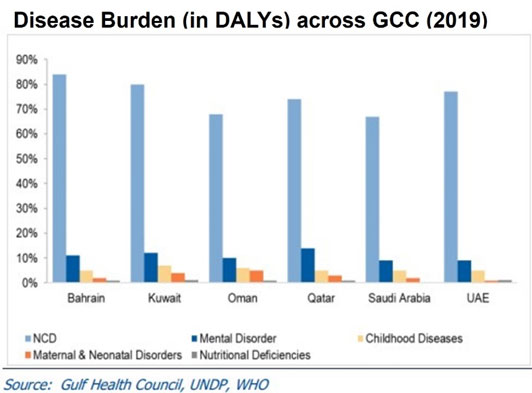According to the World Bank, NCDs are now the leading cause of death and disability in the GCC, with mortality rates surpassing those of developed nations
Despite advancements in primary healthcare standards, the GCC region continues to face a significant health and economic burden due to the increasing prevalence of non-communicable diseases (NCDs). Sedentary lifestyles and poor dietary habits have led to a surge in diseases such as cardiovascular conditions, cancer, diabetes, and chronic respiratory illnesses. According to the World Bank, NCDs are now the leading cause of death and disability in the GCC, with mortality rates surpassing those of developed nations. As of 2019, NCDs accounted for % of total deaths in the region, up from 74.2% in 2016. Cardiovascular diseases, cancer, chronic respiratory diseases, and diabetes alone made up 62.5% of total fatalities in 2019 compared to 55.0% in 2016.

According to the World Bank, NCDs are now the leading cause of death and disability in the GCC, with mortality rates surpassing those of developed nations
The financial impact of these conditions is substantial. In 2019, the direct medical costs of major NCDs in the GCC stood at approximately US$ 29.7 billion, while indirect costs—stemming from losses in productivity—reached around US$ 21.3 billion. Compounding this challenge is the region’s aging population, which is expected to drive up the incidence of chronic illnesses and further strain healthcare resources. With increasing life expectancy and an expanding elderly demographic, the demand for specialized healthcare services will continue to grow, necessitating targeted investments in advanced treatment facilities and long-term care solutions.
Beyond NCDs, childhood diseases, maternal and neonatal conditions, nutritional deficiencies, and mental health disorders contribute to the disease burden in the region. Mental health conditions affect approximately 15% of the GCC population, necessitating improved disease management and specialized care facilities.
Governments across the GCC are actively collaborating with global healthcare operators to develop facilities focused on chronic and acute care
The Rise of Specialized Centers of Excellence (CoE)
To meet the increasing demand for complex treatments and cater to the growing burden of disease, the GCC has witnessed a rapid rise in the establishment of specialized Centers of Excellence (CoEs). These state-of-the-art facilities, accredited by international healthcare organizations, are equipped with cutting-edge medical technologies and provide a patient-centric approach to treatment. Governments across the GCC are actively collaborating with global healthcare operators to develop facilities focused on chronic and acute care, including oncology, cardiology, orthopedics, obstetrics, gynecology, pediatrics, and endocrinology.
The Dubai Health Investment Strategy 2024, for example, is aimed at enhancing services for chronic disease management by developing CoEs specializing in cardiology, oncology, diabetes, orthopedics, and other disciplines. The initiative seeks to improve access to long-term care, rehabilitation, and home-based care for elderly and high-risk patients. Future strategies include population health management, value-based care, genetic medicine, and precision medicine. The UAE has made significant strides in CoE development, housing multiple specialized medical facilities across various disciplines. Abu Dhabi’s Department of Health (DoH), in collaboration with AstraZeneca, is set to launch a CoE dedicated to rare diseases, focusing on hematology, neurology, and metabolic disorders. Similarly, Saudi Arabia is witnessing a growing transformation of tertiary care facilities into CoEs. In 2023, the Kingdom’s Ministry of Health and VitalAire Arabia announced plans to establish a CoE for Type 1 diabetes care. More recently, Dammam Eye & Dental Hospital received CoE accreditation in ophthalmology, marking a significant milestone in specialized healthcare services.
Beyond treatment centers, GCC governments are partnering with private institutions to drive specialized research and innovation
Beyond treatment centers, GCC governments are partnering with private institutions to drive specialized research and innovation. King Abdullah University of Science and Technology (KAUST) recently launched four CoEs focused on AI-driven healthcare advancements, precision medicine, and digital transformation in medical research. The Center of Excellence in Thrombosis and Hemostasis (COETH) at King Saud University and the Center of Excellence in Trauma and Accidents at King Abdulaziz University further highlight the region’s commitment to addressing specialized healthcare needs.
As the disease burden continues to rise, strategic investments in specialized healthcare infrastructure, advanced medical research, and technology-driven solutions will be crucial in ensuring long-term healthcare sustainability in the GCC. For healthcare providers and investors, this presents opportunities to develop high-demand services, expand specialized care offerings, and contribute to a rapidly evolving healthcare ecosystem. The increasing need for geriatric care, chronic disease management, and precision medicine underscores the potential for long-term growth in the region’s healthcare sector.
 4 min
4 min